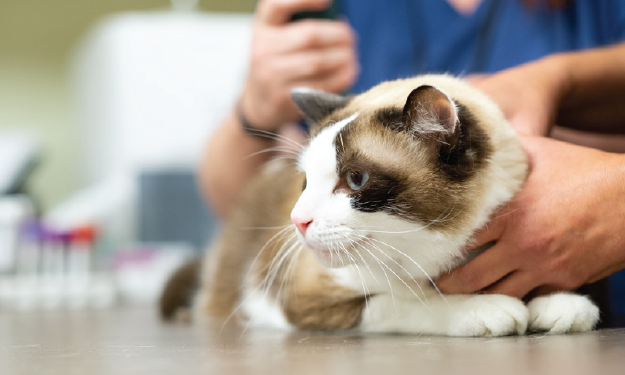Oral Cancer in Cats

What is Squamous Cell Carcinoma?
Squamous Cell Carcinoma (SCC) is the most common type of oral cancer in cats. This type of cancer develops from the tissues that line the inside of the mouth and tongue.
What Are The Most Common Clinical Signs?
The signs seen in cats with SCC are non-specific and often consist of difficulty with eating, drinking, decreased appetite, increased salivation, bad breath (halitosis), nasal discharge, oral discharge, or a noticeable mass in the mouth.
How Does this Cancer Behave in Cats?
This cancer type causes clinical signs as a result of the primary tumor in the oral cavity. The risk of cancer spread to other parts of the body is small, and generally will occur very late in the course of the disease. Unfortunately, in the majority of cases, the tumor is often detected after the tumor has invaded into surrounding soft tissue and bone in the mouth. Tumors that are in the front of the mouth tend to have a better prognosis than tumors in the back of the mouth or under the tongue.
How is a Diagnosis Made, and What Other Tests Are Needed?
There are several diagnostics that are recommended in order to confirm the diagnosis and to determine the extent of disease. A small biopsy is recommended for any oral tumor found in cats. Squamous Cell Carcinoma is locally invasive. As such, when an oral SCC has been diagnosed, skull and or dental radiographs may be recommended to determine the extent of disease and severity of bone involvement. Advanced imaging, like MRI or CT scan, may also be recommended to determine the extent of disease. A fine needle aspirate of the regional lymph node may also be done to look for further evidence of metastasis if the lymph node is abnormally enlarged or firm. Thoracic radiographs are also recommended to look for any evidence of metastasis (spread of disease), although rare.
What are the Treatment Options for SCC?
In most cases, the size and location of the primary tumor prevents surgery from being an effective treatment option for cats with SCC. Tumors located at the front of the lower jaw are most amenable to surgery and can be associated with more successful outcomes.
- Radiation Therapy: Can be considered as either a treatment approach or as a means to reduce discomfort associated with the tumor. As a treatment approach, radiation therapy can be used either when surgery is not an option or to destroy microscopic tumor cells that may remain after surgery. Radiation therapy given as a palliative treatment is effective in approximately 50% of cases.
- Chemotherapy: Can be used in conjunction with radiation or surgery to shrink the oral tumor or to reduce discomfort. A favorable outcome with chemotherapy can be seen in only 20-30% of cats, where an improvement in quality of life can be seen for 2-5 months.
- Other medications: Additional medications that may control pain or discomfort linked to the primary tumor include non-steroidal anti-inflammatory drugs (such as meloxicam or piroxicam), buprenorphine, and/or Tramadol.